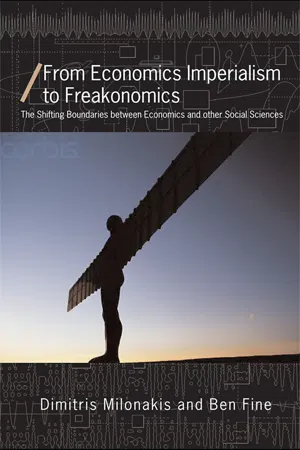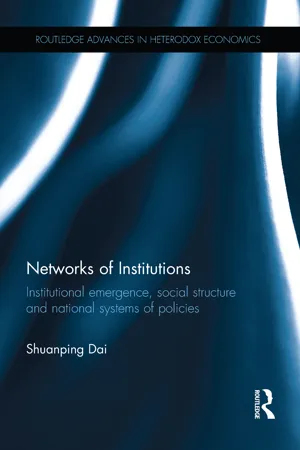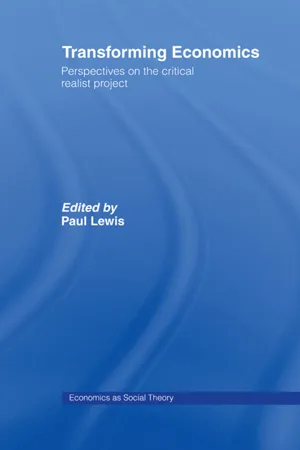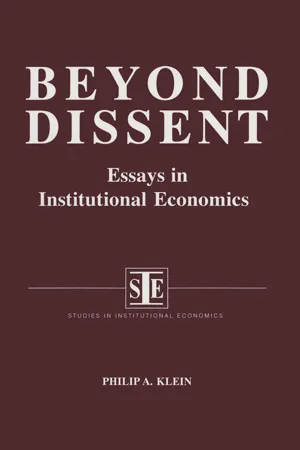Social Sciences
Economy as an Institution
Economy as an institution refers to the system of production, distribution, and consumption of goods and services within a society. It encompasses the rules, norms, and organizations that govern economic activities. As an institution, the economy influences and is influenced by social, political, and cultural factors, shaping the overall functioning of a society.
Written by Perlego with AI-assistance
Related key terms
7 Key excerpts on "Economy as an Institution"
- eBook - ePub
Rethinking Economics
An Introduction to Pluralist Economics
- Liliann Fischer, Joe Hasell, J. Christopher Proctor, David Uwakwe, Zach Ward Perkins, Catriona Watson(Authors)
- 2017(Publication Date)
- Routledge(Publisher)
the study of the production and distribution of wealth and its role in human welfare.Now turn to the word ‘institutional’. There are important debates about the definition of an institution, but a consensus is emerging that all institutions are systems of embedded social rules, even if that definition needs nuancing in some ways and some important controversies remain.1 Such rules include laws, customs and established norms of behaviour. Consequently, systems of rules such as languages and codes of etiquette are institutions. Money is an institution because it entails shared rules concerning its value, function and exchangeability. Organisations such as states, banks, firms and universities are systems of rules, and hence also institutions. Accordingly, ‘institutional economics’ becomes the study of those institutions that are tied up with the economy and the production and distribution of wealth. In brief, institutional economics is the study of economic institutions.Note that neither economics nor institutional economics is defined here in terms of (say) analytical techniques or basic assumptions, such as rationality or utility maximisation, but rather in terms of the real objects of analysis – the institutional frameworks of economic activity. Given this orientation towards real objects of analysis, there is the possibility of recruiting insights from other disciplines – such as philosophy, psychology, law, history, sociology and political science – into the study of economic institutions. Other disciplines can contribute to our understanding of that real domain.The remainder of this essay is divided into five further sections. Section 2 offers a brief history of institutional economics. Section 3 considers some examples of the growing recognition of the importance of institutions in the analysis of economic growth and development. Section 4 addresses the nature and role of the individual and his or her motivations. Section 5 discusses property rights, the role of law and transaction costs. Section 6 concludes the essay with some brief remarks on the development of institutional economics in the future. - eBook - ePub
From Economics Imperialism to Freakonomics
The Shifting Boundaries between Economics and other Social Sciences
- Ben Fine, Dimitris Milonakis(Authors)
- 2009(Publication Date)
- Routledge(Publisher)
The strength of presence of the new institutional economics is a consequence of the extent, within economics imperialism, to which institutions have themselves become understood as synonymous with anything that is not narrowly and directly economic. In short, the institutional is the antithesis of the market, itself narrowly conceived as supply and demand, and ranges over the formal and informal, from the state through culture to customs and habits. 2 Not surprisingly, then, as revealed in Section 3 of this chapter, with the rise of the new institutional economics, the tensions between economics and sociology at their boundaries have both intensified and been accommodated by a multiplicity of methods and approaches reflecting greater or lesser tolerance to the concerns of neoclassical economics, on the one hand, and modernist, postmodernist, and even post-postmodernist, sociology on the other. Faced with the economic invaders, sociologists responded, with new economic sociology as their answer, even inspiring pre-emptive strikes with the notion that economic functioning cannot be appropriately addressed in the absence of the sociological factors that underpin markets. This is so of the classic work that is perceived to have launched the rise of the new economic sociology, Granovetter’s (1985) argument that markets must be embedded in social networks. The result has been to create chaos around the boundaries between economics and sociology, and hence the definition of the new economic sociology itself. Does the field, for example, signify the rejection of mainstream economics or its acceptance but with refinement through addition of other considerations and methods? Such confusion does not, however, mean that the separate disciplines of economics and sociology have become any less distinct in their core content and practices, and are liable to disintegrate, as seems to be suggested by Hodgson (2007 and 2008) - eBook - ePub
- Shuanping Dai(Author)
- 2015(Publication Date)
- Routledge(Publisher)
working rules—for example, regulations, laws, and informal hidden customs. In this way, the significance of institutional economics unfolds. Institutional economics, shifting from the classical framework of the exchange of commodities, focuses on the relationships among humans. It is therefore behavioristic and must subsequently treat the economic behavior of individuals as its fundamental unit of analysis.Following the Veblen-Commons paradigm, Bush (1987 :1076) defines an institution as “a set of socially prescribed patterns of correlated behavior.” In the “socially prescribed” sense, as the basic elements of society, all institutions functionally interrelate and are driven by individual behavior. The prominent term of the definition, “patterns of correlated behavior,” embodies an important concept—namely, values, including ceremonial value and instrumental value, that acts as the correlater among behaviors. Hence, an institution, in the terminology of Bush, can be considered as a social result of interacting human behaviors (ceremonial or instrumental, or both) under certain values (ceremonial or instrumental, or both). However, this definition does not capture the dynamic hallmarks of institutions in terms of interacting agents because the connected structure of behavioral patterns correlated by behavior and values are given. Furthermore, such behavioral definitions, as Foster (1981b) and Tool (1979) concur, have been criticized as being misleading. For instance, Hodgson (2006 :3) argues that such a defining approach “would lead us into presuming that institutions no longer existed if their associated behaviors were interrupted.” For example, the British monarchy exists as representative of ceremonial institutions, but independent of the royal family’s behavior and royal ceremony, and from an alternative angle, Hodgson (2006 - eBook - ePub
Transforming Economics
Perspectives on the Critical Realist Project
- Paul Lewis(Author)
- 2004(Publication Date)
- Routledge(Publisher)
This makes it difficult to become aware of the shortcomings of inefficient, or even oppressive, institutions. In the critical realist approach social scientists can help to overcome this problem. They can enable individuals to understand the mechanisms by which their interactions are structured and the nature of the institutions in which they live. In this way, the social sciences may have a progressive and emancipatory role insofar as the individuals may become aware of unsatisfactory institutions and understand some possible ways of changing them. However, in this approach, the institutions of production of social scientific knowledge must themselves be an object of study. As on the cover of Lawson’s Economics and Reality, the painter must necessarily be in the painting. The ‘Economics of Economics’ must be part of the field in the sense that the ‘Economics of Institutions’ cannot ignore the ‘Institutions of Economics’. The Institutions of Economics can help a great deal the advancement of economic studies but they can also bias research in certain directions and inhibit the development of certain topics and methods of research. It is a claim of the chapter that, in some cases, the Institutions of Economics can inhibit the progress of the Economics of Institutions. 5 Economics and maximization The view of the individual which emerges from both critical realism 6 and Institutional Economics suggests that individuals are made of a complex mix of instincts, emotions, habits and conscious rationality. In the same society the mix is very likely to change from individual to individual. Indeed, in real life individuals are characterized by different degrees of rationality and by different emotions. Moreover, these characteristics are influenced by the institutions found in society and often reflect different nationalities and different moments of history - eBook - ePub
- John Roscoe Turner(Author)
- 2019(Publication Date)
- Routledge(Publisher)
CHAPTER I INTRODUCTION: THE BEGINNING OF ECONOMIC INSTITUTIONS1. The science of economics 2. Requirements of the economist 3. Mistakes in early specialization 4. Principles first, then specialization 5. From objective to subjective control 6. Knowledge is power 7. From physical to mental 8. Three stages of progress 9. The hunter stage 10. The pastoral stage 11. Domestication and indirect production 12. Conflicting interests 13. Pressure and progress 14. Tribal property 15. Variety and trade 16. Self-sufficiency 17. The agricultural stage 18. What the agriculturist must know 19. Three essentials of thrift 20. A settled life 21. Production and civilization 22. Slavery 23. The conclusion 24. From primitive to manoral times 25. Feudalism 26. The manoral system in England 27. Ashley's picture of the eleventh-century manor 28. Tenants 29. Self-sufficiency on manors 30. The relation of property to government 31. Exercises 1. The Science of EconomicsScience originates in man's endeavor to answer the eternal question "why." In answer to this question, thinkers are ever on the alert to detect agreements and differences among things. The untutored see a million phenomena, but these in chaotic mass. The scholar sees the same phenomena, but subjects these to law and order. He ties things with like qualities into a bundle by themselves, and this bundle is the subject-matter of a science.Why are there panics in the business world? Why does the cost of living continue to rise? Why does a movie actor get more for a single performance than a common laborer gets for a year's work? Why is there mutual profit in trading? Why do we have monopolies? and why are some monopoly prices high and others low?Problems of this sort are legion, but when exposed to examination they are found to exist in causal relationship. They may be tied into one bundle, and they form the subject-matter of one science—the science of Economics. - eBook - ePub
- Michael Keaney(Author)
- 2002(Publication Date)
- Routledge(Publisher)
Hamilton’s description of institutionalism in his 1919 manifesto was unelaborate, and required refinement, but in its essentials it has endured the test of time. It can be rephrased and refined in terms of the following five propositions:- Although institutional economists are keen to give their theories practical relevance, institutionalism is not itself defined in terms of any policy proposals.
- Institutionalism makes extensive use of ideas and data from other disciplines such as psychology, sociology and anthropology in order to develop a richer analysis of institutions and of human behaviour.
- Institutions are the key elements of any economy, and thus a major task for economics is to study institutions, and the processes of institutional conservation, innovation and change.
- The economy is an open and evolving system, situated in a natural environment, effected by technological changes, and embedded in a broader set of social, cultural, political and power relationships.
- The notion of individual agents as utility-maximising is regarded as inadequate or erroneous. Institutionalism does not take the individual as given. Individuals are affected by their institutional and cultural situation. Hence individuals do not simply (intentionally or unintentionally) create institutions. Through ‘reconstitutive downward causation’ institutions affect individuals in fundamental ways.3
Most of these points are direct elaborations of ideas from Hamilton’s (1919) text However, regarding point (c), although he hinted at the concept, Hamilton did not mention the words ‘open system’. The phrase did not become widely used until Ludwig von Bertalanffy (1950) and others developed it much later. Subsequently, institutional economists such as K.William Kapp (1968:8) and Shigeto Tsuru (1993:73) made the idea of the economy as an open system one of the defining characteristics of institutionalism.Furthermore, Hamilton did not use the words ‘evolving’ or ‘evolutionary’. Subsequently, it has often been said that institutional economists take an ‘evolutionary’ approach. Institutionalists are very fond of this word, even to the point of proclaiming it in the titles of their academic associations.4 - eBook - ePub
Beyond Dissent: Essays in Institutional Economics
Essays in Institutional Economics
- Philip A. Klein(Author)
- 2016(Publication Date)
- Routledge(Publisher)
8 In short, “growth” refers to mere quantitative increase in whatever the economy is currently doing. “Development” refers to directing the economy toward objectives which have both qualitative and quantitative dimensions. Hence, economies customarily—but not invariably—grow. Mainstream economists are usually comfortable coping with growth and consider the directing of growth one of their primary preoccupations. Development, as we shall see, is a very different matter. Why should this be the case?The Institutionalist Foundations of Modern Development Economics
In his Theory of Business Enterprise Thorstein Veblen pitted the machine process and the requirements of the industrial process against business enterprise motivated by pecuniary gain. It was dominance for long periods of the former by the latter which created the kind of tension capitalist economies all exhibit.9 It was this notion, coupled with John Dewey’s emphasis on “the means-end continuum” and the instrumental theory of value, that formed the core of ClarenceAyres’s perspective. The relationship between technology and institutions permeated all of Ayres’s work as, for example, his comment on Veblen:He conceived the economy as the system of related activities by which the people of any community get their living. This system embraces a body of knowledge and of skills and a stock of physical equipment; it also embraces a complex network of personal relations reinforced by custom, ritual, sentiment, and dogma. This conception of the economy—one that is applicable to a paleolithic culture no less than to our own, and to our own no less than to any other—is Thorstein Veblen’s principal bequest to succeeding generations.10The hallmark by which institutional economics can be differentiated from mainstream economics is, therefore, that the economist qua economist must pay attention to all of these factors. It is precisely here that mainstream economists prefer to part company with institutionalists.
Learn about this page
Index pages curate the most relevant extracts from our library of academic textbooks. They’ve been created using an in-house natural language model (NLM), each adding context and meaning to key research topics.






